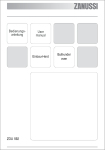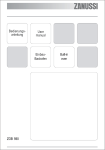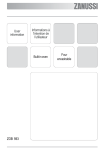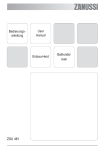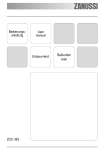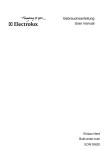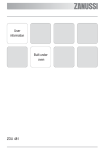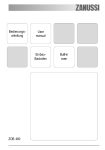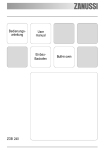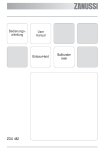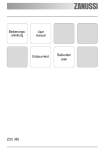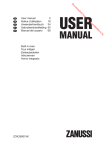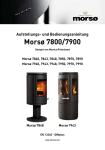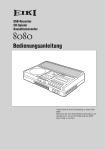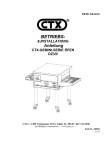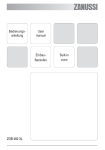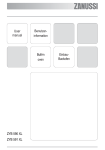Download ZOB 590 Bedienungs- anleitung Einbau
Transcript
Bedienungsanleitung User manual EinbauBackofen ZOB 590 Built-in oven Deutsch Inhaltsverzeichnis Warnungen und wichtige Hinweise --------------------- 3 Gerätebeschreibung ----------------------------------------- 4 Bedienelemente --------------------------------------------- 5 Erstinstallation ----------------------------------------------- 7 Programmieren des Ofens ------------------------------ 8 Sonderfunktionen ------------------------------------------- 10 Benutzung des Backofens -------------------------------- 13 Back- und Brattabelle -------------------------------------- 15 Reinigung und Wartung ------------------------------------ 17 Wenn etwas falsch läuft ----------------------------------- 20 Technische Daten ------------------------------------------- 20 Anweisungen für den Installateur ------------------------ 21 Elektroanschluss ------------------------------------------- 21 Einbau-Anweisungen -------------------------------------- 22 Kundendienst ------------------------------------------------ 23 Anleitung zur Gebrauchsanweisung Sicherheitshinweise ) Schritt-für-Schritt-Anleitung Praktische Tipps Umweltinformationen 2 Warnungen und wichtige Hinweise Heben Sie auf jeden Fall die mit diesem Gerät gelieferte Gebrauchsanweisung auf. Sollte nämlich das Gerät an Dritte abgegeben oder verkauft werden, oder falls Sie das Gerät bei einem Umzug in der alten Wohnung lassen sollten, ist es von größter Wichtigkeit, dass der/die neue Nutzer(in) über diese Gebrauchsanweisung und die Hinweise verfügen kann. Diese Hinweise dienen der Sicherheit des Nutzers und seiner Mitbewohner. Lesen Sie sie also aufmerksam, bevor Sie das Gerät anschließen und/oder in Gebrauch nehmen. Installation Die Installation muss unter Beachtung der bestehenden Vorschriften von fachkundigem Personal vorgenommen werden. Die einzelnen Installationsarbeiten sind unter den Hinweisen für den Installateur beschrieben. z Lassen Sie die Installation und den Anschluss von einem Fachmann, gemäß den ihm dank seiner Fachkenntnis bekannten Richtlinien ausführen. z Auch gegebenenfalls auf Grund der Installation erforderliche Modifikationen an der Stromversorgung haben durch einen Fachmann zu erfolgen. z Betrieb z Dieser Backofen ist zur Zubereitung von Speisen gedacht; gebrauchen Sie ihn niemals zu Anderem. z Beim Öffnen der Backofentür während oder am Ende des Garens auf den Heißluftstrom achten, der aus dem Backofen austritt. z Beim Herdbetrieb mit erhöhter Vorsicht vorgehen. Durch die starke Hitze der Heizkörper sind Rost und sonstige Teile sehr heiß. z Falls Sie - aus welchen Gründen auch immer - AluFolie zur Zubereitung von Speisen im Backofen verwenden sollten, lassen Sie diese nie in direkten Kontakt mit dem Boden des Backofens kommen. z Gehen Sie bei der Reinigung des Backofens vorsichtig vor: sprühen Sie nie auf den Fettfilter (falls vorhanden), die Heizstäbe und den Thermostatfühler. z Es ist gefährlich, an diesem Gerät oder an seinen Eigenschaften Veränderungen jeglicher Art vorzunehmen. z Während des Back-, Brat- und Grillvorgangs werden das Backofenfenster und die übrigen Geräteteile heiß, deshalb sollten Kinder vom Gerät ferngehalten werden. Bei Anschluss von Elektrogeräten an Steckdosen in Backofennähe, ist darauf zu achten, dass Anschlussleitungen nicht mit heißen Kochstellen in Berührung kommen oder in der heißen Backofentür eingeklemmt werden. z z z z z z z Feuerfeste, heiße Schüsseln oder Töpfe stets nur mit Topfhandschuhen aus dem Backofen nehmen. Eine regelmäßige Reinigung verhindert den vorzeitigen Verschleiß des Oberflächenmaterials. Schalten Sie vor der Reinigung des Backofens entweder den Strom ab oder ziehen Sie den Netzstecker. Stellen Sie sicher, daß der Backofen in der « AUS » Position ist, wenn er nicht mehr benutzt wird. Dieser Backofen wurde je nach Ausführung als Einzelgerät oder als Kombinationsgerät mit Elektroplatte für den Anschluß an Ein-Phase an 230 V hergestellt. Das Gerät darf nicht mit einem Heißdampf- oder Dampfstrahlreiniger gereinigt werden. Benutzen Sie keine Scheuermittel oder scharfe Metallschaber. Sie können die Türscheiben verkratzen und dadurch zum Zerspringen der Scheiben führen. Personensicherheit Dieses Gerät ist für den Gebrauch seitens Erwachsenen bestimmt. Es ist gefährlich, wenn Sie es Kindern zum Gebrauch oder Spiel überlassen. z Halten Sie Kinder fern, wenn der Backofen in Betrieb ist. Auch nachdem Sie den Backofen ausgeschaltet haben, bleibt die Türe noch lange heiß. z Das Gerät darf von Kindern oder Personen, deren physische, sensorische oder geistige Fähigkeiten und deren Mangel an Erfahrung und Kenntnissen einen sicheren Gebrauch des Gerätes ausschließen, nur unter Aufsicht oder nach entsprechender Einweisung durch eine verantwortungsbewusste Person benutzt werden, die sicherstellt, dass sie sich den Gefahren des Gebrauchs bewusst sind. z Kundendienst z Lassen Sie Überprüfungsarbeiten und/oder Reparaturen vom Kundendienst des Herstellers oder von einem vom Hersteller autorisierten Kundendienst ausführen und verwenden Sie nur Original-Ersatzteile. 3 z • • Das Gerät darf bei Funktionsstörungen oder Schäden niemals vom Benutzer selbst repariert werden. Durch Reparaturen seitens ungeschulter Personen können Schäden oder Verletzungen hervorgerufen werden. Umweltinformationen Ein Gerät, das nicht funktioniert, muß vom Stromnetz getrennt werden, damit es nicht versehentlich benützt wird. Ziehen Sie bei ausgedienten Geräten den Netzstecker aus der Steckdose und machen Sie Netzschlußleitung sowie Stecker unbrauchbar. Sie verhindern damit, daß ein Mißbrauch mit den Geräten getrieben wird. Gerätebeschreibung auf dem Gerät bzw. auf dem Das Symbol Verpackungsmaterial weist darauf hin, dass es nicht über den normalen Hausmüll entsorgt werden darf. Stattdessen muss es an einer geeigneten Sammelstelle für die Wiederverwertung elektrischer und elektronischer Geräte abgegeben werden. Durch Ihren Beitrag zum korrekten Entsorgen dieses Produkts schützen Sie die Umwelt und die Gesundheit Ihrer Mitmenschen. Umwelt und Gesundheit werden durch falsches Entsorgen gefährdet. Weitere Informationen über das Recycling dieses Produkts erhalten Sie von Ihrem Rathaus, Ihrer Müllabfuhr oder dem Geschäft, in dem Sie das Produkt gekauft haben. 2 1 B 3 4 5 1. 2. 3. 4. 5. 6. 7. 6 7 Bedienungsblende Elektronische Zeitschaltuhr Luftschächte für Kühlungsventilator Grillrost Innenbeleuchtung Umluft-/Heißluftgebläse Typenschild Ofenzubehör Rost Backblech Auffangblech 4 Bedienungsblende TEMPERATURANZEIGE ANZEIGE DER GARFUNKTIONEN UHRZEITANZEIGE 1 2 3 4 5 6 Drucktasten 1. 2. 3. 4. 5. 6. EIN / AUS Funktionswahlschalter Schnelles Aufheizen Taste zum Verringern des eingestellten Wertes „ “ (Zeit oder Temperatur) Taste zum Steigern des eingestellten Wertes „ “ (Zeit oder Temperatur) Programmierung von Kurzzeitwecker, Garzeit und Garzeitende ACHTUNG Bei Stromausfall bleiben die eingegebenen Daten etwa 3 Minuten lang im Speicher der Programmiereinheit gespeichert. Danach werden die Daten gelöscht und müssen neu eingegeben werden, wenn wieder Strom vorhanden ist. Die Garfunktionen werden von einer elektronischen Programmiereinheit gesteuert. Jede Art von Garfunktion, Gartemperatur und Garzeit kann ausgewählt werden. Sonderfunktionen Folgende Funktionen können durch die gleichzeitige Betätigung von zwei Tasten ausgewählt werden: Kindersicherheitssperre: die Tasten Piep-Signal: die Tasten und “ “ drücken; und “ “ drücken; ‘Demo’-Funktion: Die Tasten B und ” “ drücken. 5 Ein- und Ausschalten des Ofens Der Ofen muss eingeschaltet werden, bevor eine Funktion/ ein Garprogramm ausgewählt werden kann. Bei jeder Betätigung der Taste erscheint das Symbol des Ofens auf dem Display und die Ofenbeleuchtung wird eingeschaltet. Der Ofen kann in jedem Augenblick ausgeschaltet werden. betätigen: Alle Zum Ausschalten des Ofens, die Taste Funktionen/Garprogramme werden abgebrochen, die Ofenbeleuchtung erlischt und auf dem Display erscheint die aktuelle Uhrzeit. Auswählen einer Garfunktion Den Ofen durch Betätigen der Taste Die Taste einschalten. betätigen, um die gewünschte Funktion Taste erscheint auszuwählen. Bei jeder Betätigung der das Symbol der Garfunktionen auf dem Display und zeigt an, welche Funktion in jenem Augenblick aktiv ist. Neben dem Symbol der ausgewählten Garfunktion erscheint die entsprechende Nummer (Abb. 1). Für jede Garfunktion erscheint auf dem Display der Temperaturen die eingestellte Temperatur. Sollte die eingestellte Temperatur nicht der gewünschten Temperatur entsprechen, die Tasten “ “ und “ “ betätigen, um die Temperatur in 5 Stufen einzustellen. - Das Symbol des Thermometers Ofentemperatur an; Abb. 1 zeigt die Wenn die Temperatur im Ofen den Wert der eingestellten Temperatur erreicht, ertönt ein akustisches Signal und das Symbol des Thermometers hört auf zu blinken. Liegt die Innentemperatur über der eingestellten Temperatur (z. B., wenn die Garfunktion beendet und der Ofen noch warm ist), so erscheint sie nicht auf dem Display. Ändern der Temperatur und der eingestellten Garzeit Mit den Tasten “ “ oder “ “ die eingestellte Temperatur ändern, während das Symbol “°” blinkt (Abb. 2). Die programmierbare Höchsttemperatur beträgt 250 °C. Mit den Tasten “ “ oder “ “ die eingestellte Garzeit und Garzeitdauer verändern, während das Symbol blinkt (Abb. 2). 6 B Abb. 2 Die Symbole zeigen der Reihe nach die verfügbaren 5 Garfunktionen an. 1 Heißluft - Die Hitze wird durch das Gebläse einheitlich verteilt. Die eingestellte Temperatur beträgt 175 °C. 2 Ober- und Unterhitze - Die Hitze kommt von oben und von unten. Die eingestellte Temperatur beträgt 200 °C. 3 Einfacher Grill - Die Ofenhitze kommt nur von oben. Die eingestellte Temperatur beträgt 250 °C. 4 Pizza backen - Die kombinierte Wirkung der von unten kommenden Hitze und der vom Gebläse verteilten Heißluft ermöglicht das einheitliche Backen von Pizzas oder gesalzenen Torten. Die eingestellte Temperatur beträgt 175 °C. 6 Doppelter Grill - Der Ofen gibt starke Hitze nur von oben ab. Die eingestellte Temperatur beträgt 250 °C. 7 Unteres Garen - Der Ofen gibt eine mäßige Hitze nur von unten ab. Die eingestellte Temperatur beträgt 250 °C. Heißluftgrill - Die Hitze kommt nur von oben und wird vom Gebläse verteilt. Die eingestellte 8 Temperatur beträgt 180 °C. Wählen Sie eine Temperatur von höchstens 200 °C. Oberes Garen - Der Ofen gibt eine mäßige Hitze nur von oben ab. Die eingestellte Temperatur beträgt 250 °C. 9 Auftauen - Das Gebläse lässt die Luft im kalten Ofen kreisen und beschleunigt so das Abtauen tiefgefrorener Speisen. Erst-Installation Wenn der Ofen zum ersten Mal an das Stromnetz angeschlossen wird, erscheinen auf der Anzeige die Zahlen “12.00” und das Symbol blinkt. Um den Ofen in Betrieb nehmen zu können, muss die aktuelle Uhrzeit eingegeben werden. Abb. 3 Zum Einstellen der aktuellen Uhrzeit: a) während das Symbol blinkt, die Uhrzeit mit den Tasten “ “ oder “ “ einstellen (Abb. 3). Das Symbol verschwindet etwa 5 Sekunden nach der letzten Einstellung (Abb. 4). b) wenn das Symbol Drucktaste nicht mehr blinkt, Zweimal die Abb. 4 betätigen (Abb. 5). Dann wie unter Punkt “a” beschrieben fortfahren. Entfernen Sie das gesamte Verpackungsmaterial innen und außen am Backofen, bevor Sie ihn in Betrieb nehmen. Vor dem erstmaligen Gebrauch sollte der Backofen einmal aufgeheizt werden, ohne dass sich Lebensmittel darin befinden. Abb. 5 Dabei kann sich ein unangenehmer Geruch entwickeln. Das ist normal. Die Ursache sind Herstellungsrückstände. Stellen Sie sicher, dass der Raum gut belüftet ist. 7 Nun: - Den Ofen durch Betätigen der Taste - Zweimal die Taste einschalten. betätigen und die Funktion ‘Herkömmliches Garen’ auswählen (Abb. 6). - Mit der Taste “ “ eine Temperatur von 250°C einstellen. - Den LEEREN Ofen etwa 45 Minuten heizen. Sie können den Ofen auch für eine Zeit von 45 Minuten programmieren. - Den Raum während dieser Zeit gut lüften. Es wird empfohlen, das oben beschriebenen Verfahren Abb. 6 durch Auswählen der Garfunktion ‘Doppelter Grill’ sowie die Funktion ‘Heißluft‘ etwa 5-10 Minuten lang zu wiederholen. Bevor man mit dem Garen beginnt, das ROST und die FETTPLATTE gut reinigen. Programmieren des Ofens Verwendung der Kochuhr - Die Taste zum Aktivieren der Funktion drücken Kochuhr (Abb. 7). Das Symbol fängt an zu blinken und auf dem Display erscheinen die Zahlen “0.00” - Mit der Taste “ “ die gewünschte Zeit einstellen. Die einstellbare Höchstzeit beträgt 23 Stunden und 59 Minuten. - Nach Einstellen der Garzeit wartet die Kochuhr 3 Sekunden, dann beginnt der Zeitablauf (Abb. 8). - Nach Ablauf der eingestellten Zeit ertönt ein Signalton. Zum Abstellen des Signaltons eine beliebige Taste drücken. Achtung: Die Funktion Kochuhr schaltet den Ofen NICHT automatisch aus, wenn er in Betrieb ist. Abb. 7 Abb. 8 Ändern der Einstellungen der Kochuhr Die Taste betätigen bis die zwei Symbole auf dem Display blinken. Nun mit “ und “ oder “ “ die Einstellung ändern. Löschen der Einstellungen der Kochuhr: Die Taste betätigen bis die zwei Symbole und auf dem Display blinken (Abb. 9). Die Taste “ “ drücken, bis auf dem Display die Zahlen “0.00”erscheinen . 8 Abb. 9 Programmierung der Ofenausschaltung - Stellen Sie die zu garende Speise in den Ofen, wählen Sie die Garfunktion und die gewünschte Temperatur aus (Abb. 10). - Die Taste zum Aktivieren der Funktion drücken “Garzeit” (Abb. 11). Das Symbol “Garzeit” blinkt und auf dem Display erscheinen die Zahlen “0.00”. Abb. 10 - Mit der Taste “ “ die gewünschte Zeit einstellen, während das Symbol blinkt. Die einstellbare Höchstzeit beträgt 23 Stunden und 59 Minuten. - Nach Einstellen der Garzeit wartet die Programmiereinheit 3 Sekunden, dann beginnt der Zeitablauf. - Nach Ablauf der eingestellten Zeit schaltet sich der Ofen automatisch aus und ein Signalton ertönt. Auf dem Display erscheinen die Zahlen “0.00”. Abb. 11 - Zum Abstellen des Signaltons eine beliebige Taste drücken. Zum Löschen der Garzeit: - Die Taste betätigen, bis die Symbol auf dem Display blinkt. - Die Taste “ “ drücken, bis auf dem Display die Zahlen “0.00” erscheinen (Abb. 12). Programmierung der Ofenein- und ausschaltung Abb. 12 - Die “Garzeit” wie auf der vorherigen Seite beschrieben einstellen. - Die Taste drücken und Funktion “Garzeit” auswählen; das entsprechende Symbol fängt zu blinken an. Auf dem Display erscheint nun das Ende der Garende (d. h. die aktuelle Uhrzeit plus die eingestellte Garzeit - Abb. 13). - Mit der Taste “ “ das gewünschte Ende der Garzeit einstellen. - Nach Einstellen der Garzeit wartet die Programmiereinheit 3 Sekunden, dann beginnt der Zeitablauf. Abb. 13 - Der Ofen schaltet sich automatisch ein und aus, das Ende der Garzeit wird von einem Signalton gemeldet. Zum Abstellen des Signaltons eine beliebige Taste drücken. Zum Löschen der Garzeit, die auf der vorherigen Seite angegebenen Anleitungen befolgen. 9 Sonderfunktionen Vollautomatisches Ausschalten Sollten Sie vergessen, Ihren Ofen auszuschalten, schaltet diese Funktion ihn automatisch je nach der eingestellten Temperatur nach einer gewissen Zeit aus (Abb. 14). Beträgt die Temperatur: 250°C schaltet der Ofen sich aus nach: 3 Stunde von 200°C bis 245°C 5,5 Stunden von 120°C bis 195°C 8,5 Stunden weniger als 120°C 12 Stunden Abb. 14 Nutzung der Restwärme Programmieren Sie das vollautomatische Ausschalten des Ofens, schaltet sich dieser tatsächlich einige Minuten vor dieser eingestellten Zeit aus. Auf diese Weise wird die Restwärme im Ofen zum vollständigen Garen der Speisen genutzt und ermöglicht so eine Energieeinsparung. Die Meldungen auf dem Display werden bis zum Ende der eingestellten Garzeit angezeigt. Diese Sonderfunktion ist nicht aktiv, wenn die eingestellte Garzeit weniger als 15 Minuten beträgt. Kindersicherheitssperre Die Ofensteuerungen können gesperrt werden, um das Einschalten durch Kinder beim Spielen zu vermeiden. - Ist der Ofen eingeschaltet, schalten Sie ihn mit Hilfe der Taste aus. - Drücken Sie gleichzeitig die Tasten und “ “ und halten Sie sie mindestens 3 Sekunden lang gedrückt. Man hört einen kurzen Signalton und auf dem Display erscheint die Anzeige ‘SAFE’ (Abb. 15). - Der Ofen ist nun gesperrt. Nun kann keine Garfunktion ausgewählt werden. Abb. 15 Um die Sperre aufzuheben: - Drücken Sie gleichzeitig die Tasten und “ “ und halten Sie sie mindestens 3 Sekunden lang gedrückt. Ein kurzer Signalton ertönt und die Anzeige ‘SAFE’ verschwindet vom Display; der Ofen kann nun wieder benutzt werden (Abb. 16). 10 Abb. 16 Schnellheizfunktion Nach der Auswahl der gewünschten Garfunktion und der Einstellung der Gartemperatur, heizt der Ofen bis die gewünschte Temperatur erreicht wird. Die Aufheizzeit des Ofen dauert etwa 10-15 Minuten, je nach der ausgewählten Garfunktion und der eingestellten Temperatur. Soll die eingestellte Temperatur in kürzerer Zeit erreicht werden, kann man die Funktion ‘Schnellheizen’ wählen. 1) Den Ofen durch Betätigen der Drucktaste einschalten; 2) Die Garfunktion gemäß der Anleitungen hier oben auswählen; 3) Stellen Sie die Temperatur mit den Tasten “ “ und “ “ ein. Die Temperaturanzeige blinkt auf dem Display; 4) Drücken Sie die Taste B . Die Schrift “FHU” erscheint auf dem Display (Abb. 17). 5) Beim Drücken der Taste , blinkt das Symbol der eingestellten Temperatur “°” etwa 10 Sekunden lang, und zeigt so an, dass die Temperatur mit den Tasten “ “ und “ “ noch genauer eingestellt werden kann. 6) Wenn die Temperatur des Ofens den eingestellten Wert erreicht, lässt die Programmiereinheit einen kurzen Signalton ertönen und die eingestellte Temperatur wird auf dem Display angezeigt. B Abb. 17 Diese Funktion kann bei der Auswahl jeder Garfunktion und Temperatur verwendet werden. Demofunktion Dieser Modus dient den Fachgeschäften zur Vorführung der Backofenfunktionen ohne Stromverbrauch, abgesehen von der Innenbeleuchtung, dem Display und dem Gebläse. Diese Funktion lässt sich nur bei Erstanschluß einschalten. Bei einem Stromausfall, wenn die Stromversorgung wiederhergestellt wird, lässt sich die Demofunktion, nur wenn im Display automatisch die Angabe 12:00 und das Symbol blinkt, einschalten. 1. Berühren Sie die Taste etwa 2 Sekunden lang. Ein kurzer Signalton ist zu hören. 2. Berühren Sie gleichzeitig die Tasten und „ ”. Ein kurzer Signalton ist zu hören, auf dem Display 11 erscheint die Ührzeit 12:00 angegeben (Abb. 18). Beim Einschalten des Backofens erscheint das Symbol auf dem Display, das bedeutet daß die Demofunktion aktiviert ist. Alle Funktionen des Backofens können ausgewählt werden. Der Backofen ist nicht wirklich in Betrieb und die Heizelemente schalten sich nicht ein. Schalten Sie den Ofen ab und gehen Sie wie oben beschrieben vor, um den Demobetrieb wieder auszuschalten. Die Demofunktion bleibt bei Stromausfall im Programm gespeichert. Fehlercode Die elektronische Programmiereinheit führt ständig einen Diagnosetest des Systems durch. Sind einige Parameter nicht korrekt, z. B. aufgrund der nicht korrekten Verwendung des Ofens, stellt die Steuereinheit die aktuellen Funktionen aus und auf dem Display erscheint der entsprechende Fehlercode (“F” gefolgtvon Ziffern). Sicherheits-Thermostat Um gefährliche Überhitzung zu vermeiden (durch unsachgemäßen Gebrauch des Gerätes oder defekte Bestandteile), ist der Backofen mit einem SicherheitsThermostat ausgestattet, welcher die Stromversorgung unterbricht. Die Wiedereinschaltung erfolgt automatisch bei Temperaturabfall. Sollte der Sicherheits-Thermostat aufgrund unsachgemäßen Gebrauchs des Gerätes ansprechen, genügt es, nach der Abkühlung des Backofens die Fehlerursache zu beseitigen. Spricht dagegen der Thermostat wegen eines defekten Bauteiles an, so wenden Sie sich bitte an den Kundendienst. Kühlventilator Der Kühlventilator kühlt den Backofen und das Bedienfeld. Der Ventilator springt automatisch an, wenn der Backofen einige Minuten in Betrieb ist. Warme Luft wird durch die Blende in der Nähe des Ofentürgriffs ausgeblasen. Nachdem der Backofen ausgeschaltet wurde, läuft der Ventilator möglicherweise noch weiter, um die Bedienelemente zu kühlen. Das ist normal. Wie lange der Ventilator weiterläuft, richtet sich danach, wie lange der Backofen in Betrieb war und welche Temperatur gewählt wurde. Bei niedrigeren Temperatureinstellungen schaltet sich der Ventilator möglicherweise gar nicht ein, oder er läuft nicht weiter, wenn der Backofen nur kurzzeitig in Betrieb war. 12 Abb. 18 Benutzung des Backofens Beim Garen die Backofentür immer geschlossen halten. Dieser Ofen ist mit einem exklusiven Garsystem ausgestattet, das einen natürlichen Luftstrom erzeugt und die Kochdämpfe kon-tinuierlich in Umlauf bringt. Das Garen der Speisen erfolgt somit in einer ständig feuchten Umgebung, welche die Spei-sen innen zart und außen knusprig gart. Die Garzeiten und der Energieverbrauch werden auf ein Mindestmaß verringert. Während des Garens wird Dampf erzeugt, der beim Öffnen der Tür austreten kann. Das ist normal. Beim Öffnen der Ofentür, während oder am Ende des Garens auf den Heißluft-strom achten, der aus dem Ofen austritt. Wenn Speisen erhitzt werden, wird Dampf erzeugt wie das in einem Kochkessel geschieht. Wenn der Dampf mit dem Backofen-Türglas in Berührung kommt, kondensiert er und es entstehen Wasser-Tröpfchen. Um Kondensation zu verringern, den leeren Backofen immer 10 Minuten vorheizen! Wir empfehlen Ihnen, die Wassertropfen nach jedem Garvorgang wegzuwischen. Die Backofentür muss beim Garen geschlossen sein. Gehen Sie beim Öffnen der Backofentür sorgfältig vor. Lassen Sie die Tür nicht „offen fallen“, sondern benutzen Sie den Türgriff, bis die Tür vollständig geöffnet ist. Der Backofen hat vier Einschubebenen. Die Positionen der Einschübe werden vom Boden des Backofens aus gezählt, wie in der Abbildung gezeigt. Die Einschübe müssen unbedigt richtig eingesetzt werden (siehe Abbildung). Stellen Sie Geschirr und Töpfe nicht direkt auf den Boden des Backofens. Geschmacksübertragung findet selbst bei unterschiedlichen Gerichten. Bei Heissluftbetrieb können bis zu 2 Bleche Kleingebäck gleichzeitig eingeschoben werden. Beim Backen oder Garen in nur einer Etage wird empfohlen, zur besseren Beobachtung, die unteren Einschiebeleisten zu benützen. Heisslufbetrieb eignet sich auch besonders gut zum Sterilisieren und zum Dörren von Pilzen oder Obst. Grillen Alle Fleischarten eignen sich zum Grillen, Ausnahme machen lediglich Wildfleisch und Hackbraten. Fleisch und Fisch werden vor dem Grillen mit Öl bestrichen. Je flacher das Grillgut ist, um so näher am Grillstab grillen und umgekehrt. Der Rost kann mit Wölbung nach oben oder nach unten eingeschoben werden. Um eine gute Bräunung zu erzielen, wird der Rost in die 4. Einschiebeleiste, also dicht unter den Grill geschoben. Mit etwas Wasser in der Fettpfanne wird die Reinigung erleichtert. Fettpfanne in die erste Einschiebeleiste von unten einschieben. Bei jedem Back-, Brat- oder Grillvorgang muss die Backofentür geschlossen bleiben. Während des Backofenbetriebs bleibt die Backofenlampe eingeschaltet. Heißluftgrill Beim Heißluftgrill eine maximale Temperatur von 200°C stellen. Daraufhin setzt ein abwechselndes Funktionieren von Grill und Ventilator ein (Konvektionsbetrieb). Diese Betriebsweise ermöglicht das gleichmäßige Eindringen der Wärme in das Kochgut, ohne die Oberfläche über zu lange Zeit hinweg der direkten Bestrahlung des Grills auszusetzen. Die Funktion ist besonders geignet für: die Zubereitung großer Fleischstücke, Geflügel und ganzer Fische wie Forellen, Makrelen oder Meeräschen. Ober- und Unterhitze Hitze von oben und von unten. Es wird empfohlen die mittlere Einschiebeleiste zu benutzen. Sollte das Gericht mehr Wärme von oben oder von unten benötigen, sobenutzen Sie die oberen oder die unteren Einschiebeleisten. Heißluft Die Wärmeübertragung geschieht hierbei durch heisse Luft, die von dem Lüfterrad in der Backofenrückwand in Bewegung gesetzt wird (Zwangs-Konvektion). Damit verteilt sich die Wärme gleichmäßig und schnell im Backofen. Daher können in den verschiedenen Etagen mehrere Gerichte gleichzeitig gegart werden . Durch die ständige Luftbewegung keine Geruch-oder 13 Unterhitze Diese Funktion ist besonders nützlich beim Blindbacken von Teig. Sie kann auch für Quiches oder Pasteten verwendet werden, damit gewährleistet ist, dass der Grundteig durchgebacken ist. Oberhitze Diese Funktion eignet sich zum Überbacken von fertigen Gerichten, zum Beispiel Lasagne oder überbackener Blumenkohl usw. Pizza Die kombinierte Wirkung der von unten kommenden Hitze, des Ringheizkörpers und der vom Gebläse verteilten Heißluft ermöglicht das einheitliche Backen von Pizzas oder gesalzenen Torten. Auftauen Das Gebläse läuft ohne Hitze und wälzt die Luft bei Raumtemperatur im Garraum um. Vergewissern Sie sich, dass sich der Temperaturregler in der Position AUS befindet. Ratschläge Zum Backen: Backgut erfordert gewöhnlich eine mässige Temperatur (150200°C) und daher ist ein Vorheizen des Backofens von ca. 10 Minuten notwendig. Die Backofentür nicht öffnen, bevor 3/4 der Backzeit abgelaufen ist. Mürbeteig wird in der Springform oder auf dem Blech bis zu 2/ 3 der Backzeit gebacken und danach garniert, bevor er fertiggebakken wird. Diese weitere Backzeit ist abhängig von der Art und Menge der Garnitur. Rührteige müssen schwer vom Löffel reissen. Die Backzeit würde durch zuviel Flüssigkeit unnötig verlängert werden. Werden zwei Backbleche mit Gebäck gleichzeitig in den Ofen eingeschoben, muss zwischen den Blechen eine Einschiebeleiste freigelassen werden . Werden zwei Backbleche mit Gebäck gleichzeitig in den Ofen eingeschoben, müssen die Bleche nach etwa 2/3 der Backzeit von oben nach unten getauscht und gedreht werden. Zum Braten: Nicht weniger als 1 kg Braten nehmen, klei-nere Stücke könnten beim Braten austrokknen. Dunkles Fleisch, das aussen gut gegart, jedoch innen noch rosa bis rot bleiben soll, muss bei höherer Temperatur (200-250°C) gebraten werden. Helles Fleisch, Geflügel, und Fisch erfordern dagegen eine niedrigere Temperatur (150-175°C). Die Sossenzutaten werden 14 nur bei kurzer Garzeit gleich zu Beginn in die Bratenpfanne gegeben, andernfalls werden sie in der letzten halben Stunde zugegeben. Ob das Fleisch gar ist, können Sie mit einem Löffel prüfen: lässt es sich nicht eindrücken, so ist es durchgebraten. Roastbeef und Filet, die innen rosa bleiben sollen, müssen bei höherer Temperatur in kürzerer Zeit gebraten werden. Beim Garen von Fleischgerichten direkt auf dem Rost zum Auffangen des SaftesFettpfanne in die Leiste unten einschieben. Den Braten vor dem Anschneiden mindestens 15 Minuten stehen lassen, damit der Fleischsaft nicht ausfliessen kann. Um die Rauchbildung im Backofen zu ver-mindern, empfiehlt es sich, ein wenig Wasser in die Fettpfanne zu giessen. Um Kon-densbildung zu vermeiden, mehrmals Wasser zugeben. Die Teller können bis zum Servieren im Backofen bei Mindesttemperatur warmgehalten werden. Vorsicht! Den Backofen nicht mit Alufolie auslegen und kein Kochgeschirr, keine Fettpfanne oder Backblech auf den Boden stellen, da sonst das Backofenemail durch den entstehenden Hitzestau beschädigt wird. Garzeiten Die Garzeiten können unterschiedlich sein, aufgrund der verschiedenen Zusammenset-zung, Zutaten-und Flüssigkeitsmenge der einzelnen Speisen. Merken Sie sich die Einstelldaten der ersten Koch-bzw. Bratvorgänge, um Erfahrung zu sammeln für die spätere Zubereitung gleicher Gerichte. Aufgrund Ihrer eigenen Erfahrungen können Sie die angegebenen Werte individuell verändern. Die Ofentür stets nur am Griff im mittleren Bereich anfassen . Back- und Brattabelle Ober- und Unterhitze sowie Heißluft Zeitangaben beinhalten kein Vorheizen. Den leeren Backofen immer 10 Minuten vorheizen. Ober- und Unterhitze GERICHT KUCHEN Rührteig Mürbeteig Buttermilch-Käsekuchen Apfelkuchen Strudel Marmeladentorte Rührkuchen Biskuitkuchen Stollen Pflaumenkuchen Kleine Kuchen Biskuits Baiser Hefekleingebäck Gebäck: Brandteig Törtchen BROT UND PIZZA Weißbrot Roggenbrot Brötchen Pizza FLANS Pasta-Flan Gemüse-Flan Quiches Lasagne Cannelloni FLEISCH Rind Schwein Kalb Englisches Roastbeef rot 2 rosa durch Schweineschulter Schweinshaxe Lamm Hähnchen Truthahn Ente Gans Kaninchen Hase Fasan Hackbraten FISCH Forelle/Meerbrasse Thunfisch/Lachs 4 3 2 1 Heißluft Temp. (°C) 4 3 2 1 2 2 1 1 2 2 2 1 1 1 3 2 2 2 2 oder 3 2 170 170 175 170 180 190 170 170 150 175 170 160 135 200 210 180 2 (1und3)* 2 (1und3)* 2 2 links+rechts. 2 2 (1und3)* 2 2 (1und3)* 2 2 2 2 (1und3)* 2 (1und3)* 2 2 (1und3)* 2 1 1 2 2 195 190 200 200 2 2 1 2 2 Garzeit in Minuten HINWEISE Temp. (°C) 160 160 165 160 160 180 150 165 150 160 160 150 150 190 170 170 45-60 20-30 60-80 90-120 60-80 40-45 60-70 30-40 120-150 50-60 20-35 20-30 60-90 12~20 25-35 45-70 Kuchenform Kuchenform Kuchenform Kuchenform Backblech Kuchenform Kuchenform Kuchenform Kuchenform Brotpfanne Backblech Backblech Backblech Backblech Backblech Kuchenform 2 185 1 180 2 (1und3)* 175 2 200 60-70 30-45 25-40 20-30 Brotpfanne Backblech Backblech 200 200 210 200 200 2 (1und3)* 175 2 (1und3)* 175 1 190 2 200 2 200 40-50 45-60 30-40 25-35 25-35 Backform Backform Backform Backform Backform 2 2 2 190 180 190 2 2 2 175 175 175 50-70 100-130 90-120 Rost Rost Rost 210 2 2 2 2 2 2 2 2 2 2 2 2 2 2 210 210 180 180 190 190 180 175 175 190 190 190 180 200 2 2 2 2 2 2 2 2 1 2 2 2 2 50-60 200 200 170 160 175 200 160 220 160 175 175 175 170 Rost 60-70 70-80 120-150 100-120 110-130 70-85 210-240 120-150 150-200 60-80 150-200 90-120 insg.. 150 Rost Rost mit Schwarte 2 Stck Keule Ganz Ganz komplett komplett In Stücken In Stücken komplett Brotpfanne 2 2 190 190 2 (1und3)* 175 2 (1und3)* 175 40-55 35-60 3-4 Fische 4-6 Filets (*) Falls Sie gleichzeitig mehr als ein Gericht garen, empfehlen wir, diese auf den in Klammern angegebenen Ebenen abzustellen. 15 Einfacher Grill - Doppelter Grill - Zeitangaben beinhalten kein Vorheizen. Den leeren Backofen immer 10 Minuten vorheizen. Menge Grillen GERICHT Filetsteaks Beefsteaks Grillwürste Schweinskotelett Hähnchen (in 2 Hälften) Spieße Hähnchenbrust Hamburger* *5’00'’ vorheizen Fischfilet Belegte Toastbrote Weißbrotscheiben Stück Gr. 4 4 8 4 2 4 4 6 800 600 / 600 1000 / 400 600 4 4~6 4~6 400 / / 4 3 2 1 Garzeit in Minuten Temp. (°C) 1. Seite 2. Seite 3 3 3 3 3 3 3 2 250 250 250 250 250 250 250 250 12~15 10~12 12~15 12~16 30~35 10~15 12~15 20-30 12~14 6~8 10~12 12~14 25~30 10~12 12~14 3 3 3 250 250 250 12~14 5~7 2~4 10~12 / 2~3 Heißluftgrill Wählen Sie bei Verwendung der Heißluftgrill eine Höchsttemperatur von 200°C. Menge GERICHT Rouladen (Pute) Hähnchen (halbiert) Hähnchenschenkel Wachtel Gemüsegratin St. Jacques Muscheln Makrelen Fischscheiben Garzeit in Minuten Umluftgrill Stück G. 1 2 6 4 — — 2-4 4-6 1000 1000 — 500 — — — 800 4 3 2 1 3 3 3 3 3 3 3 3 Temp. (°C) 200 200 200 200 200 200 200 200 1. Seite 2. Seite 30~40 25~30 15~20 25~30 20~25 15~20 15~20 12~15 20~30 20~30 15~18 20~25 — — 10~15 8~10 Pizza-Funktion GERICHT Pizza, groß Pizza, klein Brötchen Pizza-Funktion 4 3 2 1 1 1 1 Garzeit in Minuten Temp. (°C) 200 200 200 15~25 10~20 15~25 ANM. Backblech Backblech oder Rost Backblech Die angegebenen Temperaturen sind Richtwerte. Die Temperatur ist unter Umständen persönlichen Ansprüchen anzupassen. 16 Reinigung und Wartung Vor dem Reinigen den Backofen ausschalten und abkühlen lassen. Das Gerät darf nicht mit einem Heißdampf oder Dampfstrahlreiniger gereinigt werden. Wichtig: Vor jeder Reinigungsarbeit das Gerät unbedingt spannungslos machen. Für eine lange Lebensdauer des Gerätes ist es nötig, regelmäßig folgende Reinigungsarbeiten vorzunehmen: - Durchführung nur bei abgekühltem Backofen. - Die emaillierten Teile mit Seifenlauge reinigen. - Keine Scheuermittel verwenden. - Edelstahlteile und Glasscheiben mit einem weichen Tuch trockenreiben. - Bei hartnäckigen Flecken handelsübliche Reinigungsmittel für Edelstahl oder warmen Essig benutzen. Die Emaillierung des Backofens ist äußerst haltbar und weitgehenst unempfindlich. Die Einwirkung von heißen Fruchtsäuren (Zitronen, Pflaumen oder ähnliches) können jedoch auf der Emailoberfläche belibende, matte und rauhe Flecken hinterlassen. Solche Flecken in der Hochglanzoberfläche der Emaille beeinträchtigen die Funktion des Backofens jedoch nicht. Reinigen Sie den Backofen grundsätzlich nach jedem Gebrauch. Verschmutzungen lassen sich so am leichtesten entfernen. Ein weiteres Einbrennen wird damit vermieden. • Metallschwämmchen • Chemische Ofenreiniger oder Sprühdosen • Rostentferner • Waschbecken-/Spülen - Fleckentferner Reinigen Sie die Außen- und Innenseite der Glastür mit warmem Seifenwasser. Sollte die Innenseite der Glastür stark verschmutzt sein, benutzen Sie Reinigungsprodukte wie ‘Hob Brite’. Benutzen Sie keine Schaber, um den Schmutz zu entfernen. Garraum Der Emailleboden des Garraums lässt sich am Besten reinigen, wenn der Backofen noch warm ist. Wischen Sie ihn nach jedem Backofengebrauch mit einem weichen in Seifenwasser angefeuchteten Schwamm aus. Von Zeit zu Zeit ist jedoch mithilfe eines speziellen Reinigungsmittels für Backöfen eine gründlichere Reinigung erforderlich. Reinigungsmittel Kontrollieren Sie vor der Verwendung von Reinigungsmitteln immer, ob diese für Ihren Ofen geeignet sind und vom Hersteller empfohlen werden. Reinigungsmittel, die Bleiche enthalten, sollten NIE verwendet werden, da sie die Oberflächenbehandlung stumpf werden lassen. Vermeiden Sie ebenso die Verwendung von Scheuermitteln. Reinigung der Außenseiten Wischen Sie regelmäßig die Bedienblende, die Backofentür und die Türdichtungen mit einem weichen Lappen ab, den Sie in warmem Wasser mit etwas flüssigem Reinigungsmittel angefeuchtet haben. Verwenden Sie zur Vermeidung von Beschädigungen der Backofenglastür auf keinen Fall: • Haushaltsreinigungsmittel und Bleichlauge • imprägnierte Reinigungschwämme, die für Kochtöpfe mit Antihaftbeschichtung ungeeignet sind 17 Grill-Heizkörper Bei diesem Modell ist der Grill abklappbar, sodass die Backofendecke besonders einfach zu reinigen ist. Vergewissern Sie sich zuvor, dass der Herd abgekühlt und von der Stromversorgung getrennt ist. 1) Lösen Sie die Schraube, mit der das Grillelement fixiert ist (siehe Abb.). Wenn Sie dies zum ersten Mal tun, empfiehlt es sich, einen Schraubenzieher zu benutzen. 2) Ziehen Sie das Grillelement dann vorsichtig nach unten, sodass die Backofendecke zugänglich wird (siehe Abb.). 3) Reinigen Sie die Backofendecke mit einem geeigneten Reinigungsmittel und trocknen Sie sie, bevor Sie das abklappbare Grillelement wieder in die Ausgangsposition bringen. 4) Drücken Sie das Grillelement vorsichtig nach oben an die ursprüngliche Stelle und schrauben Sie die Haltemutter wieder gut fest. Vergewissern Sie sich, dass die Haltemutter am Grillelement ordnungsgemäß festgezogen ist, damit es bei Gebrauch nicht herunterfallen kann. Einschubgitter Zur Reinigung der Seitenwände lassen sich die Einschubgitter auf der linken und rechten Seite im Backofen abnehmen. Einschubgitter abnehmen Gitter zuerst vorne von der Backofenwand wegziehen und dann hinten aushängen (Abb. 19, Abb. 20). Einschubgitter einsetzen Zum Einbau Gitter zuerst hinten wieder einhängen und dann vorne anlegen und andrücken (Abb. 21). Tauchen Sie die Einschubgitter zum Reinigen in warmes Seifenwasser und entfernen Sie hartnäckigen Schmutz mit einem gut eingeseiften imprägnierten Schwamm. Gut nachwischen und mit einem weichen Tuch trocken wischen. Abb. 19 Abb. 20 Reinigung der Backofen-Tür Bauen Sie die Ofentür aus, bevor Sie mit der Reinigung beginnen. Gehen Sie hierzu folgendermaßen vor: 1. Öffnen Sie die Backofentür vollständig. 2. Suchen Sie die Scharniere, mit denen die Tür am Backofen befestigt ist (Abb. 22). 18 Abb. 21 3. Entriegeln Sie die kleinen Hebel an den beiden Scharnieren (Abb. 23) und drehen Sie diese. 4. Fassen Sie die Tür an ihrer linken und rechten Seite an und klappen Sie sie dann langsam in Richtung Backofen, bis sie halb geschlossen ist (Abb. 24). 5. Ziehen Sie die Ofentür dann vorsichtig heraus (Abb. 24). 6. Legen Sie die Tür auf eine ebene Oberfläche. Reinigen Sie die Ofentürscheiben nur mit warmem Seifenwasser und einem weichen Tuch. Vewenden Sie dazu niemals Scheuermittel. Bauen Sie nach dem Reinigen die Ofentür wieder ein und gehen Sie dabei in umgekehrter Reihenfolge vor. Abb. 22 Geräte mit Edelstahl- oder Aluminiumoberflächen Wir empfehlen, die Ofentür nur mit einem feuchten Schwamm zu reinigen und danach mit einem weichen Tuch trocken zu wischen. Verwenden Sie nie Stahlwolle, Säuren oder Scheuermittel, die die Oberflächen beschädigen können. Reinigen Sie die Bedienblende auf dieselbe Weise. REINIGEN Sie die Backofentür NICHT, solange die Scheiben noch warm sind. Bei Missachtung dieser Anweisung kann die Glasscheibe zersplittern. Falls die Glasscheibe Risse oder tiefe Kratzer aufweist, ist die Struktur des Glases beeinträchtigt und die Scheibe muss wegen des möglichen Risikos der Zersplitterung ersetzt werden. Wenden Sie sich an den lokalen Kundendienst, der Ihnen gern weiter hilft. Abb. 23 Abb. 24 Auswechseln der Backofen-Glühlampe Ziehen Sie den Netzstecker. Beim Auswechseln der Backofen-Glühlampe sollten Sie darauf achten, dass die neue Lampe folgende Merkmale aufweist: - Elektrische Leistung: 25 W, - Elektrische Spannung: 230 V, 50 Hz, - Hitzebeständigkeit von 300 °C, - Anschlussart: E14. Ersatzlampen können Sie bei Ihrem Fachhändler beziehen. Auswechseln einer schadhaften Backofen-Glühlampe: 1. Vergewissern Sie sich, dass der Herd abgekühlt ist. 2. Drücken Sie die Glashaube nach innen und schrauben Sie sie entgegen dem Uhrzeigersinn ab. 3. Entfernen Sie die durchgebrannte Lampe und setzen Sie eine neue ein. 4. Bringen Sie die Glashaube wieder an und stecken Sie den Netzstecker des Backofens wieder in die Steckdose. Abb. 25 19 Was tun wenn etwas falsch läuft Wenn das Gerät nicht richtig arbeitet, bitte vor Anforderung des Electrolux Service-Centers folgendes überprüfen: ABHILFE FEHLER Der Backofen schaltet nicht ein. Kontrollieren Sie: • Hat die Sicherung in der Hausinstallation ausgelöst? • Ist die Kindersicherung oder die Ein/Abschaltautomatik eingeschaltet? • Hat die Betriebsdauerbegrenzung für den Backofen angesprochen? • Ist der “DEMO”-Mode eingestellt? Siehe Kapitel “Demo Funktion ausschalten”. oder Prüfen, ob das Gerät ordentlich angeschlossen ist und der Steckdosen-Schalter oder die Netzstromzufuhr zum Backofen auf EIN stehen. Die Ofenthermostatanzeige leuchtet nicht. Stellen Sie mit dem Temperaturregler für den Thermostat eine gewünschte Temperatur ein. oder Stellen Sie mit dem Ofenfunktionsschalter eine Garfunktion ein. Die Backofen-Glühlampe brennt nicht. Stellen Sie mit dem Temperaturregler für den Thermostat eine gewünschte Temperatur ein, oder ÜberprüfenSiedieLampeundwechselnSiesiegegebenenfalls aus (siehe “Auswechseln der Backofen-Glühlampe”). Die Zubereitung der Gerichte dauert zu lange oder sie garen zu schnell. Es kann sein, dass die Temperatur eingestellt werden muss, oder Ziehen Sie den Inhalt dieser Anleitung zu Rate, besonders das Kapitel „Benutzung des Backofens“. Dampf und Kondenswasser setzen sich auf Wenn der Garvorgang beendet ist, die Gerichte nicht Fehlercode „F..“ wird auf dem Display Notieren Sie den Fehlercode und wenden Sie sich an den den Speisen und in der Backofenmuffel ab. angezeigt. länger als 15-20 Minuten im Backofen stehenlassen. lokalen Kundendienst. Technische Daten Unterhitze Oberhitze Ober-/Unterhitze Grill Doppelgrill Umluftgrill Heissluft - Beheizung Pizza Funktion Backofen-Lampe Motor des Heißluftgebläses Motor der Kühlungsbelüftung Gesamtanschlusswert Betriebsspannung (50 Hz) 20 1000 W 800 W 1800 W 1650 W 2450 W 1675 W 2000 W 3000 W 25 W 25 W 25 W 3075 W 230 V Einbaunische Höhe Breite Tiefe unter Oberkante in Nische mm 587 mm 600 mm 560 mm 550 Einsatz Höhe Breite Tiefe Backofenkapazität mm 335 mm 395 mm 400 53 l Anweisungen für den Installateur Einbau und Installation sind streng unter Beachtung der bestehenden Vorschriften durchzuführen. Alle Eingriffe dürfen nur bei ausgeschaltetem Gerät vorgenommen werden. Eingriffe dürfen nur von anerkannten Fachleuten durchgeführt werden. Der Hersteller lehnt jede Haftung ab, falls die Sicherheitsvorschriften nicht beachtet werden. Elektroanschluss Vor dem Anschluss bitte folgendes beachten: - Die Sicherung und die Hausinstallation müssen auf die max. Belastung des Gerätes ausgelegt sein (siehe Typenschild). - Die Hausinstallation muss mit einem vorschriftsmäßigen und den geltenden Vorschriften entsprechenden Erdanschluss ausgestattet sein. - Die Steckdose oder der mehrpolige Ausschalter müssen auch nach erfolgter Installation des Gerätes einfach zu erreichen sein. Das Gerät wird mit Netzkabel geliefert. Am Kabel ist ein Netzstecker mit den auf dem Typenschild des Geräts angegebenen elektrischen Kennwerten anzubringen. Für den Stecker muss eine passende Wandsteckdose vorbereitet werden. Bei einem Direktanschluss des Ofens an das Netz muss zwischen dem Gerät und dem Netz ein allpoliger Trennschalter mit einer Mindest - Kontaktöffnung von 3 mm eingebaut werden, der für die erforderliche Stromaufnahme bemessen ist und die einschlägigen Vorschriften erfüllt. Der grüngelbe Erdleiter darf nicht durch den Schalter unterbrochen werden und muss 2-3 cm länger als die anderen Leiter sein. Die vorhandene Netzanschlussleitung mit Stecker ist an eine Schutzkontaktsteckdose (230 V~, 50 Hz) anzuschließen. Die Schutzkontaktsteckdose muss vorschriftsmäßig installiert sein. Als Anschlussleitungen sind, unter Berücksichtigung des jeweils erforderlichen Nennquerschnittes, folgende Typen geeignet: H07 RN-F, H05 RN-F, H05 RR-F, H05 VV-F, H05 V2V2-F (T90), H05 BB-F. Das Anschlusskabel muss jedenfalls so ausgelegt sein, dass es an keiner Stelle 50°C (über der Raumtemperatur) erreicht. Nach erfolgtem Anschluss sind die Heizelemente zu prüfen, indem sie ca. 3 Minuten lang betrieben werden. Klemmenleiste Der Backofen ist mit einem leicht zugänglichen Klemmenblock ausgerüstet, der für den Betrieb mit Einphasenspannung von 230 V ausgelegt ist (Abb. 26). L N oder E - Spannungführende Klemme Nullleiterklemme Erdungsklemme Abb. 26 21 Einbau-Anweisungen Backofenabmessungen (Abb. 27) EinbauAnweisungen Zur einwandfreien Funktion des Einbaugerätes müssen das Einbaumöbel bzw. die Einbaunische, in die das Gerät eingebaut werden soll, geeignete Abmessungen aufweisen (Abb. 28-29). Abb. 27 Abb. 28 IN 550 M Befestigung im Möbel 1. Backofentür öffnen. 2. Den Backofen mittels der vier Abstandsstücke (Abb. 30-A), die genau in die vorgesehenen Rahmenlöcher passen, und den vier Holzschrauben (Abb. 30-B) am Möbel befestigen. 560 - 57 0 Abb. 29 Abb. 30 22 600 Zur einwandfreien Funktion des Einbaugerätes müssen das Einbaumöbel bzw. die Einbaunische geeignete Abmessungen aufweisen. Gemäß den bestehenden Vorschriften müssen alle Teile, die den Berührungsschutz spannungsführender und betriebsisolierter Teile gewährleisten, so befestigt sein, dass sie nicht ohne Werkzeug abgenommen werden können. Hierzu gehört auch die Befestigung eventueller AbschlussSeiten am Anfang oder Ende einer Anbaulinie. Der Berührungsschutz muss auf jeden Fall durch den Einbau sichergestellt sein. Das Gerät kann mit seiner Rückseite bzw, mit einer Seitenwand an höhere Küchenmöbel, Geräte bzw. Wände gestellt werden. An die andere Seitenwand dürfen jedoch nur andere Geräte oder Möbel mit gleicher Höhe wie das Gerät angestellt werden. 80÷ 100 Kundendienst Wenn nach den beschriebenen Kontrollen das Problem nicht gelöst werden kann, rufen Sie den nächsten Kundendienst des Herstellers und geben Sie die Art des Defektes, das Gerätemodell (Mod.), die Produktionsnummer (Prod. Nr.) sowie die Fabrikations-nummer (Ser. Nr.) an, welche Sie auf dem Typenschild des Ofens finden (Abb. 31). Die Original-Ersatzteile des Herstellers, welche mit dem folgenden Markenzeichen gekennzeichnet sind, finden Sie ausschließlich in den Zentralen unseres Kundendienstes sowie in autorisierten ErsatzteilGeschäften. Abb. 31 23 English Contents Warnings and important safety information ------------ 25 Description of the appliance ------------------------------- 26 Control panel ------------------------------------------------ 27 When the oven is first installed --------------------------- 28 Using the oven --------------------------------------------- 31 Programming the oven ------------------------------------ 35 Special functions -------------------------------------------- 36 Baking and roasting table --------------------------------- 39 Cleaning and maintenance ------------------------------- 41 If something is wrong -------------------------------------- 44 Technical data ----------------------------------------------- 45 Instructions for the Installer ------------------------------- 45 Connecting to the electrical supply ---------------------- 45 Instructions for building In --------------------------------- 46 Service and spare parts ---------------------------------- 47 Guide to using the user instructions Safety instructions ) Step by step instructions Hints and Tips Environmental information 24 Warnings and important safety information Always keep these user instructions with the appliance. Should the appliance be passed on to third persons or sold, or if you leave this appliance behind when you move house, it is very important that the new user has access to these user instructions and the accompanying information. These warnings are provided for the safety of the users and those living with them. So read them carefully before connecting and/or using the appliance. Installation • • • The installation must be performed by a qualified person in accordance with the rules and regulations in force. The individual operations for installing the appliance are described under the instructions for the installer. Have the appliance installed and connected by a qualified person with specialist knowledge, who will carry it out in accordance with the directives. If any modifications to the power supply are required because of the installation, these should also be carried out by a qualified electrician. Operation • • • • • • • • This oven is designed for cooking foodstuffs; never use it for other purposes. When opening the oven door during or at the end of cooking be careful of the stream of hot air, which comes out of the oven. Be very careful when using the cooker. The extreme heat of the heating elements makes the shelves and other parts very hot. If you should for whatever reason use aluminium foil to cook food in the oven, never allow it to come into direct contact with the floor of the oven. When cleaning the oven, proceed with care: never spray anything onto the grease filter (if fitted), the heating elements and the thermostat sensor. If is dangerous to make modifications of any kind to this appliance or to its specifications. During the baking, roasting and grilling process, the oven window and the other parts of the appliance get hot, so children should be kept away from the appliance. Take care, if connecting electrical appliances to sockets near the oven, that cables do not come into contact with hot rings or get caught in the oven door. Always use oven gloves to take hot ovenproof dishes or pots out of the oven. • • • • • • Regular cleaning prevents the surface material from deteriorating. Before cleaning the oven, either turn the power off or pull the mains plug out. Make sure that the oven is in the “OFF” position, when the oven is no longer being used. This oven was made as a single appliance or as a combination appliance with electrical hotplate, depending on the model, for single-phase connection to 230 V. The appliance must not be cleaned with a superheated steam cleaner or a steam jet cleaner. Do not use abrasive cleaners or sharp metal scrapers. These can scratch the glass in the oven door, which may result in the shattering of the glass. People safety • • • This appliance is intended for use by adults. It is dangerous to allow children to use it or play with it. Children should be kept away while the oven is working. Also, after you have switched the oven off, it remains hot for a long time. This appliance is not intended for use by children or other persons whose physical, sensory or mental capabilities or lack of experience and knowledge prevents them from using the appliance safely without supervision or instruction by a responsible person to ensure that they can use the appliance safely. Customer service • • Have checks and/or repairs carried out by the manufacturer’s service department or by a service department authorised by the manufacturer and use only original spare parts. Do not attempt to repair the appliance yourself in the event of malfunctions or damage. Repairs carried out by untrained persons may cause damage or injury. 25 Environmental information • After installation, please dispose of the packaging with due regard to safety and the environment. When disposing of an old appliance, make it unusable, by cutting off the cable. Remove any door catches to prevent small children being trapped inside. • The symbol on the product or its packaging indicates that this product is not to be treated as normal household waste. Instead it must be handed over to a collection point for the recycling of electrical and electronic equipment. The correct disposal of this product will help to protect the environment and human health. Environment and health are endangered by incorrect disposal. For more detailed information about recycling of this product, please contact your local town hall, your household waste disposal service or the shop where you purchased the product. Description of the appliance 1 2 B 3 4 5 1. 2. 3. 4. 5. 6. 7. 6 7 Control panel Electronic programmer Air vents for cooling fan Grill Oven light Oven fan Rating plate Oven accessories Dripping pan Cake tray Shelf 26 Control panel Cooking function 1 Temperature display 2 3 4 Time display 5 6 Push buttons 1. ON / OFF 2. Oven Function Control 3. Fast Heat Up Function 4. Decreasing Control “ “ (Time or Temperature) 5. Increasing Control “ “ (Time or Temperature) 6. Minute minder / Cooking duration function / End of cooking function All the oven functions are controlled by an electronic programmer. You can select any combination of cooking function, cooking temperature and automatic timing. NOTE In the event of a power failure, the programmer will keep all the settings (time of day, programme setting or programme in operation) for about 3 minutes. If power fails for a longer time, all the settings will be cancelled. When the power is restored, the numbers in the display will flash, and the clock/timer has to be reset. 27 When the oven is first installed Remove all packaging, both inside and outside the oven, before using the oven. When the oven is first connected to the electrical supply, the display will automatically show 12:00 and the symbol will flash. Ensure the correct time of day is set before using the oven. To set the correct time of day: a) while the symbol is flashing , set the correct time of day by pressing buttons “ “ or “ “ (Fig. 1). The time arrow symbol will disappear about 5 seconds after the correct time is displayed (Fig. 2). b) if the symbol is not flashing anymore, press button Fig. 1 twice (Fig. 3). Then, proceed as described in point a). Fig. 2 Before first use Before using for the first time, the oven should be heated up without food. To do that, proceed as follows: — press button to switch on the oven. — press button twice and select the (Fig. 4). "Conventional Cooking" function — set the temperature to 250 °C using the increasing push button “ “. — Allow the oven to run empty for approximately 45 minutes. — open a window for ventilation. This procedure should be repeated with the "Fan Cooking" and "Full Grill" function for approximately 5-10 minutes. During this time, an unpleasant odour may be emitted. This is absolutely normal, and is caused by residues of manufacturing. Once this operation is carried out, let the oven cool down, then clean the oven cavity with a soft cloth soaked in warm water to which a little mild washing-up liquid has been added. Before cooking for the first time, carefully wash the shelves and the baking tray. 28 Fig. 3 Fig. 4 "On/Off" Push Button The oven must be switched on before setting any cooking function or programme. When button is pressed, the oven symbol will appear in the display, and the oven light will switch on. To switch off the oven, you can press button at any time. Any cooking function or programme will stop, the oven light will switch off and the time display will show the time of day only. It is possible to switch off the oven at any time. How to select a Cooking Function 1) Switch on the oven by pressing the 2) Press button button. to select the required oven function. Each time button is pressed, a cooking symbol will appear in the display and the corresponding cooking function number will appear to the left of the currently selected cooking function symbol (Fig. 5). 3) If the pre-set temperature is not suitable, press button “ “ or “ “ to adjust the temperature in 5 degree steps. - as soon as the oven heats up, the thermometer symbol Fig. 5 rises slowly , indicating the degree to which the oven is currently heated. When the required temperature is reached, an acoustic alarm will sound for a short time and the thermometer symbol will illuminate permanently. How to set the temperature and cooking time Press button “ “ and “ “ to increase or decrease the pre-set temperature while the “°” symbol is flashing (Fig. 6). The maximum temperature is 250°C. Press button “ “ and “ “ to increase or decrease the preset cooking time while the symbol is flashing (Fig. 6). Fig. 6 Safety Thermostat To prevent dangerous overheating (through incorrect use of the appliance or defective components), the oven is fitted with a safety thermostat, which interrupts the power supply. The oven switches back on again automatically, when the temperature drops. Should the safety thermostat trigger due to incorrect use of the appliance, it is enough to remedy the error after the oven has cooled down; if on the other hand, the thermostat triggers because of a defective component, please contact Customer Service. 29 The cooling fan The cooling fan is designed to cool the the oven and the control panel. The fan switches on automatically after a few minutes of cooking. Warm air is blown out through the aperture near the oven door handle. When the oven is switched off, the fan may run on after the oven is switched off to keep the controls cool. This is quite normal. The action of the cooling fan will depend on how long the oven has been used and at what temperature. It may not switch in at all at lower temperature settings nor run on where the oven has only been used for a short time. Function symbols 1 2 3 Fan cooking - This setting allows you to roast or roast and bake simultaneously using any shelf, without flavour transference. Preset temperature: 175°C 6 Conventional cooking - The heat comes from both the top and bottom element, ensuring even heating inside the oven. Pre-set temperature: 200°C 7 Inner grill - can be used for grilling small quantities. Pre-set temperature: 250°C 8 Thermal grilling - This function offers an alternative method of cooking food items, normally associated with conventional grilling. The grill element and the oven fan operate together, circulating hot air around the food. Pre-set temperature: 180°C Select a maximum temperature of 200°C. 4 Pizza oven - The bottom element provides direct heat to the base of pizzas, quiches or pies, while the fan ensures air is circulated to cook the pizza toppings or pie fillings. Pre-set temperature: 175°C 5 30 9 Full grill - The full grill element will be on. Recommended for large quantities. Pre-set temperature: 250°C Bottom heating element - The heat comes from the bottom of the oven only, to allow you to finish your dishes. Pre-set temperature: 250°C Top heating element - The heat comes from the top of the oven only, to allow you to finish your dishes. Pre-set temperature: 250°C Defrosting – The oven fan operates without heat and circulates the air, at room temperature, inside the oven. This function is particularly suitable for defrosting delicate food which could be damaged by heat, e.g. cream filled gateaux, iced cakes, pastries, bread and other yeast products. Using the oven The oven is supplied with an exclusive system which produces a natural circulation of air and the constant recycling of steam. This system makes it possible to cook in a steamy environment and keep the dishes soft inside and crusty outside. Moreover, the cooking time and energy consumption are reduced to a minimum. During cooking steam may be produced which can be released when opening the oven door. This is absolutely normal. However, always stand back from the oven when opening the oven door during cooking or at the end of it to allow any build up of steam or heat to release. Attention! - Do not place objects on the oven base and do not cover any part of the oven with aluminium foil while cooking, as this could cause a heat build-up which would affect the baking results and damage the oven enamel. Always place pans, heat-resisting pans and aluminium trays on the shelf which has been inserted in the shelf runners.When food is heated, steam is created, like in a kettle. When the steam comes into contact with the glass in the oven door, it condenses and creates water droplets. To reduce condensation, always preheat the empty oven for 10 minutes. We recommend you wipe the water droplets away after every cooking process. Always cook with the oven door closed. Stand clear when opening the drop down oven door. Do not allow it to fall open - support the door using the door handle, until it is fully open. The oven has four shelf levels. The shelf positions are counted from the bottom of the oven as shown in the diagram. It is important that these shelves are correctly positioned as shown in the diagram. Do not place cookware directly on the oven base. 31 - Fan cooking The air inside the oven is heated by the element around the fan situated behind the back panel. The fan circulates hot air to maintain an even temperature inside the oven. The advantages of cooking with this function are: Faster Preheating - As the fan oven quickly reaches temperature, it is not usually necessary to preheat the oven although you may find that you need to allow an extra 5-7 minutes on cooking times. For recipes which require higher temperatures, best results are achieved if the oven is preheated first, e.g. bread, pastries, scones, souffles, etc. - Lower Temperatures Fan oven cooking generally requires lower temperatures than conventional cooking. Follow the temperatures recommended in the cooking chart. Remember to reduce temperatures by about 2025 °C for your own recipes which use conventional cooking. Even Heating for Baking - The fan oven has uniform heating on all shelf positions. This means that batches of the same food can be cooked in the oven at the same time. However, the top shelf may brown slightly quicker than the lower one. This is quite usual. There is no mixing of flavours between dishes. How to use the fan oven 1. Switch the oven on. 2. Press the Oven Function Control button and select the “Fan Cooking” Always place dishes centrally on the shelf to ensure even browning. - Stand dishes on suitably sized baking trays to prevent spillage onto the base of the oven and make cleaning easier. - Do not place dishes, tins or baking trays directly on the oven base as it becomes very hot and damage will occur.When using this setting, heat comes from both the top and bottom elements. This allows you to cook on a single level and is particularly suitable for dishes which require extra base browning such as quiches and flans. Gratins, lasagnes and hotpots which require extra top browning also cook well in the conventional oven. How to use the conventional oven 1. Switch the oven ON. 2. Select the Conventional Oven Function by pressing the Oven Function control button appears in the display. Top oven element only This function is suitable for finishing cooked dishes, e.g. lasagne, shepherds pie, cauliflower cheese etc. Bottom oven element only This function is particularly useful when blind-baking pastry. It may also be used to finish off quiches or flans to ensure the base pastry is cooked through. Grilling - function. 3. If necessary adjust temperature setting using the “ “ or “ “ buttons. - Conventional cooking - The middle shelf position allows for the best heat distribution. To increase base browning simply lower the shelf position. To increase top browning, raise the shelf position. The material and finish of the baking trays and dishes used will affect base browning. Enamelware, dark, heavy or non-stick utensils increase base browning, while oven glassware, shiny aluminium or polished steel trays reflect the heat away and give less base browning. - 32 until the symbol - Most foods should be placed on the grid in the grill pan to allow maximum circulation of air and to lift the food out of the fats and juices. Food such as fish, liver and kidneys may be placed directly on the grill pan, if preferred. Food should be thoroughly dried before grilling to minimise splashing. Brush lean meats and fish lightly with a little oil or melted butter to keep them moist during cooking. Accompaniments such as tomatoes and mushrooms may be placed underneath the grid when grilling meats When toasting bread, we suggest that the top runner position is used. The food should be turned over during cooking, as required. How to use the Full Grill 1. Switch the oven ON. 2. Select the Full Grill function by pressing the Oven Function control button until the symbol appears in the display. 3. If necessary adjust temperature setting using the “ “ or “ “ buttons. 4. Adjust the grid and grill pan runner position to allow for different thicknesses of food. Position the food close to the element for faster cooking and further away for more gentle cooking. Preheat the grill on a full setting for a few minutes before sealing steaks or toasting. Adjust the heat setting and the shelf as necessary, during cooking. How to use the Inner Grill Element The inner grill provides quick direct heat to the central area of the grill pan. By using the inner grill element for cooking small quantities, it can help to save energy. 1. Switch the oven ON. 2. Select the Inner Grill Element by pressing the Oven until the symbol Function control button appears on the display. 3. If necessary adjust temperature setting using the “ “ or “ “ buttons. 4. Adjust the grid and grill pan runner position to allow for different thicknesses of food and follow the instructions for grilling. How to Use the Thermal Grill Select a maximum temperature of 200°C. Thermal grilling offers an alternative method of cooking food items normally associated with conventional grilling. The grill element and the oven fan operate alternately, circulating hot air around the food. The need to check and turn the food is reduced. Thermal grilling helps to minimise cooking smells in the kitchen. With the exception of toast and rare steaks, you can thermally grill all the foods you would normally cook under a conventional grill. Cooking is more gentle, therefore food generally takes a little longer to cook with thermal grilling compared with conventional grilling. One of the advantages is that larger quantities can be cooked at the same time. 2. Select the Thermal Grill Oven Function by pressing the Oven Function control button until the symbol appears on the display. 3. If necessary, press “ “ or “ “ buttons to adjust the temperature setting. Select a maximum temperature of 200°C. 4. Adjust the grid and grill pan runner position to allow for different thicknesses of food and follow the instructions for grilling. Pizza Oven The bottom element provides direct heat to the base of pizzas, quiches or pies, while the fan ensures air is circulated to cook the pizza toppings or pie fillings. To obtain the best results use the lower shelf levels. 1. Switch the oven ON. 2. Select the Pizza Oven Function by pressing the Oven Function control button until the symbol appears on the display. 3. If necessary, press “ “ or “ “ buttons to adjust the temperature setting. Defrosting The oven fan operates without heat and circulates the air, at room temperature, inside the oven. This increases the speed of defrosting. However, please note that the temperature of the kitchen will influence the speed of defrosting. This function is particularly suitable for defrosting delicate food which could be damaged by heat, e.g. cream filled gateaux, iced cakes, pastries, bread and other yeast products. How to use defrosting 1) Switch the oven on by pressing button . 2) Select the Defrosting Oven Function by pressing the Oven Function control button until the symbol appears in the display. 3) The display will show the indication “def”. 1. Switch the oven ON. 33 Hints and Tips On baking: Cakes and pastries usually require a medium temperature (150°C-200°C) and therefore it is necessary to preheat the oven for about 10 minutes. Do not open the oven door before 3/4 of the baking time has elapsed. Shortcrust pastry is baked in a springform tin or on a tray for up to 2/3 of the baking time and then garnished before being fully baked. This further baking time depends on the type and amount of topping or filling. Sponge mixtures must separate with difficulty from the spoon. The baking time would be unnecessarily extended by too much liquid. If two baking trays with pastries or biscuits are inserted into the oven at the same time, a shelf level must be left free between the trays. If two baking trays with pastries or biscuits are inserted into the oven at the same time, the trays must be swapped and turned around after about 2/3 of the baking time. Caution! Do not line the oven with aluminium foil and do not place a roasting pan or baking tray on the floor, as otherwise the oven enamel will be damaged by the heat buildup. Cooking times Cooking times can vary according to the different composition, ingredients and amounts of liquid in the individual dishes. Note the settings of your first cooking or roasting experiments to gain experience for later preparation of the same dishes. Based upon your own experiences you will be able to alter the values given in the tables. On Roasting: Do not roast joints smaller than 1 kg. Smaller pieces could dry out when roasting. Dark meat, which is to be well done on the outside but remain medium or rare inside, must be roasted at a higher temperature (200°C-250°C). White meat, poultry and fish, on the other hand, require a lower temperature (150°C-175°C). The ingredients for a sauce or gravy should only be added to the roasting pan right at the beginning if the cooking time is short. Otherwise add them in the last half hour. You can use a spoon to test whether the meat is cooked: if it cannot be depressed, it is cooked through. Roast beef and fillet, which is to remain pink inside, must be roasted at a higher temperature in a shorter time. If cooking meat directly on the oven shelf, insert the roasting pan in the shelf level below to catch the juices. Leave the joint to stand for at least 15 minutes, so that the meat juices do not run out. To reduce the build up of smoke in the oven, it is recommended to pour a little water in the roasting pan. To prevent condensation forming, add water several times. The plates can be kept warm in the oven at minimum temperature until serving. 34 To open the oven door, always hold the handle in the centre. Programming the oven How to set the minute minder 1) Press button to select the Minute Minder function (Fig. 7). The relevant symbol will flash and the control panel will display "0.00". 2) Press button “ “ to select the required time. Maximum time is 23 hours 59 minutes. After it has been set, the Minute Minder will wait 3 seconds and then start running (Fig. 8). 3) When the programmed time has elapsed, an acoustic alarm will be heard. 4) To switch off the acoustic alarm, press any button. The oven will NOT switch off if in use. The Minute Minder function can also be used as well when the oven is off. Fig. 7 Fig. 8 To use or to change the minute minder setting: until the symbols and flash. press button It is now possible to change the Minute Minder setting by pressing button “ “ or “ “. To cancel the minute minder: press button until the symbols and flash. Press button “ “ to decrease the time until "0.00" is displayed (Fig. 9). To programme the Oven to switch off Fig. 9 1) Place food in the oven, switch on the oven, select a cooking function and adjust the cooking temperature, if required (Fig. 10). 2) Press button to select the "Cooking Duration" function (Fig. 11). The "Cooking Duration" symbol will flash and the control panel will display "0.00". 3) While the symbol is flashing, press button “ “ to select the required time. Maximum time is 23 hours 59 minutes. The programmer will wait 3 seconds and then start running. 4) When cooking time is over, the oven will be switched off automatically and an acoustic alarm will be heard while the control panel will display "0.00". 6) To switch off the acoustic alarm, press any button. Fig. 10 Fig. 11 35 To cancel the Cooking Duration Time: - press button until the symbol will flash. press button “ “ to decrease the time until "0.00" is displayed (Fig. 12). To Programme the Oven to Switch On and Off 1) Carry out the "Cooking Duration" setting as described in the relevant chapter. 2) Press button until the "End of Cooking" function Fig. 12 is selected and the relevant symbol flashes. The control panel will display the end of cooking time (that is, the actual time + cooking duration time - Fig. 13). Press button “ “ to select the required end of cooking time. After this is set, the programmer will wait 3 seconds and then start running. The oven will switch on and off automatically. The end of cooking will be marked by an acoustic alarm. To switch off the acoustic alarm, press any button. Fig. 13 3) 4) 5) 6) To cancel the programme, simply cancel the Duration Time. Special functions Automatic Switch-off Function The oven will switch off automatically if any change of setting is made, according to the table below (Fig. 14). If temperature setting is: the oven will switch off: 250°C after 3 hours from 200 up to 245°C after 5,5 hours from 120 up to 195°C after 8,5 hours less than 120°C after 12 hours Residual Heat Function When a Cooking Duration time is set, the oven will automatically switch off a few minutes before the end of the programmed time, and use the residual heat to finish your dishes without energy consumption. All current settings will be displayed until the Cooking Duration time is over. This function will not operate when the Cooking Duration time is less than 15 minutes. 36 Fig. 14 Child Lock Function To avoid children switching on the oven, it is possible to lock the oven controls. 1) Turn off the oven by pressing button . 2) Press buttons and “ “ at the same time and keep them pressed for about 3 seconds. An acoustic signal will be emitted and the indication ‘SAFE’ will appear on the display (Fig. 15). 3) The oven is now locked. Neither oven functions nor temperatures can be selected. Fig. 15 To unlock the oven: Press buttons and “ “ at the same time and keep them pressed for about 3 seconds. An acoustic signal will be emitted and the indication ‘SAFE’ will go off. The oven can now be operated (Fig. 16). Fig. 16 "Fast Heat Up" function After a cooking function has been selected and the temperature has been adjusted, the cavity will gradually heat up until the selected temperature is reached. This will take from 10 to 15 minutes, depending on selected function and temperature. If it is necessary to reach the required temperature in a shorter time, the "Fast Heat Up" Function can be used. 1) Switch the oven on by pressing button . 2) Set the required cooking function and temperature as explained in the previous pages. 3) Set the temperature by pressing button “ “ or “ “. The temperature will appear on the display. 4) Press button B . The temperature display will show "FHU" (Fig. 17). B Fig. 17 5) press button and the symbol “°” will flash for approximately 10 seconds. Now it is possible to select the required temperature by pressing button “ “ or “ “. 4) When the required temperature is reached, an acoustic alarm will sound for a short time, and the temperature display will revert to the set temperature. This function can be used with any cooking function or temperature. 37 Demo mode This mode is intended to be used in shops to demonstrate the oven functionality without any power consumption except the interior light, the display and the fan. This function can only be switched on when the appliance is first connected. If there is a power failure, when the power supply is restored again, the Demo function can only be switched on if in the display 12:00 and the symbol are flashing automatically. 1. Press the button for approximately 2 seconds. An acoustic alarm will sound for a short time. 2. Press the and “ ”buttons at the same time. A short acoustic alarm will be heard and the time 12:00 will appear in the display (Fig. 18). When the oven is switched on the symbol appears in the display.This means that the Demo function is activated. B Fig. 18 All oven functions can be selected. The oven is not really working and the heating elements do not switch on. Switch off the oven and follow the procedure described above to switch off the demo mode again. The Demo function remains saved in the programme in the event of a power failure. Error code The electronic programmer does a continuous diagnostic check of the system. If some parameters are not correct, the control unit will stop the activated functions and it will show on the display the corresponding error code (Fig. 19). For further details, refer to chapter "If something is wrong“. 38 Fig. 19 Baking and roasting table Conventional Cooking and Fan Cooking Timings do not include pre-heating. The empty oven should always be pre-heated for 10 minutes. TYPE OF DISH CAKES Whisked recipies Shortbread dough Butter-milk cheese cake Apple cake (Apple pie) Strudel Jam- tart Fruit cake Sponge cake Christmas cake Plum cake Small cake Biscuits Meringues Buns Pastry: Choux Plate tarts BREAD AND PIZZA White bread Rye bread Bread rolls Pizza FLANS Pasta flan Vegetable flan Quiches Lasagne Cannelloni MEAT Beef Pork Veal English roast beef rare medium well done Shoulder of pork Shin of pork Lamb Chicken Turkey Duck Goose Rabbit Hare Pheasant Meat loaf FISH Trout/Sea bream Tuna fish/Salmon Conventional Cooking 4 3 2 1 Fan Cooking 4 3 2 1 temp °C temp °C Cooking times in minutes NOTES 2 2 1 1 2 2 2 1 1 1 3 2 2 2 2or 3 2 170 170 175 170 180 190 170 170 150 175 170 160 135 200 210 180 2 (1and3)* 2 (1and3)* 2 2lef+righ. 2 2(1and3)* 2 2(1and3)* 2 2 2 2(1and3)* 2(1and3)* 2 2(1and3)* 2 160 160 165 160 160 180 150 165 150 160 160 150 150 190 170 170 45-60 20-30 60-80 90-120 60-80 40-45 60-70 30-40 120-150 50-60 20-35 20-30 60-90 12~20 25-35 45-70 In cake mould In cake mould In cake mould In cake mould In baking tray In cake mould In cake mould In cake mould In cake mould In bread tin In baking tray In baking tray In baking tray In baking tray In braking tray In cake mould 1 1 2 2 195 190 200 200 2 1 2(1and3)* 2 185 180 175 200 60-70 30-45 25-40 20-30 In bread tin In baking tray In baking tray 2 2 1 2 2 200 200 210 200 200 2(1and3)* 2(1and3)* 1 2 2 175 175 190 200 200 40-50 45-60 30-40 25-35 25-35 In In In In In 2 2 2 190 180 190 2 2 2 175 175 175 50-70 100-130 90-120 On grid On grid On grid 2 2 2 2 2 2 2 2 2 2 2 2 2 2 210 210 210 180 180 190 190 180 175 175 190 190 190 180 2 2 2 2 2 2 2 2 2 1 2 2 2 2 200 200 200 170 160 175 200 160 220 160 175 175 175 170 50-60 60-70 70-80 120-150 100-120 110-130 70-85 210-240 120-150 150-200 60-80 150-200 90-120 tot.150 On grid On grid On grid With rind 2 pieces Leg Whole Whole Whole Whole Cut in pieces Cut in pieces Whole in bread pan 2 2 190 190 2(1and3)* 2(1and3)* 175 175 40-55 35-60 3-4 fishes 4-6 fillets mould mould mould mould mould (*) If you cook more than one dish at the same time, we recommend you place them on the levels quoted between brackets. 39 Grilling Timings do not include pre-heating. The empty oven should always be pre-heated for 10 minutes. Quantity TYPE OF DISH Fillet steaks Beef-steaks Sausages Pork chops Chicken (cut in two) Kebabs Chicken (breast) Hamburger* *Preheat 5’00'’ Fish (fillets) Sandwiches Toast Grilling - Pieces g. 4 4 8 4 2 4 4 6 800 600 / 600 1000 / 400 600 3 3 3 3 3 3 3 2 250 250 250 250 250 250 250 250 12~15 10~12 12~15 12~16 30~35 10~15 12~15 20-30 12~14 6~8 10~12 12~14 25~30 10~12 12~14 4 4~6 4~6 400 / / 3 3 3 250 250 250 12~14 5~7 2~4 10~12 / 2~3 4 3 2 1 temp.°C Cooking time in minutes 2nd side 1st side Thermal Grilling With Thermal Grilling set a maximum temperature of 200°C. TYPE OF DISH Rolled joints (turkey) Chicken ( cut in two) Chicken legs Quail Vegetable gratin St. Jacques shells Mackerel Fish slices Thermal Grilling Quantity Pieces g. 1 2 6 4 --2-4 4-6 1000 1000 -500 ---800 4 3 2 1 3 3 3 3 3 3 3 3 temp.°C 200 200 200 200 200 200 200 200 Cooking time in minutes 1st side 2nd side 30~40 25~30 15~20 25~30 20~25 15~20 15~20 12~15 20~30 20~30 15~18 20~25 --10~15 8~10 Pizza Function Pizza Function TYPE OF DISH Pizza , large Pizza , small Bread rolls 4 3 2 1 1 1 1 temp.°C 200 200 200 Cooking time in minutes 15~25 10~20 15~25 NOTES on baking tray on baking tray or on grid on baking tray The temperatures quoted are guidelines. The temperatures may have to be adapted to personal requirements. 40 Cleaning and maintenance Before cleaning switch the oven off and let it cool down. The appliance must not be cleaned with a superheated steam cleaner or a steam jet cleaner. Important: Before carrying out any cleaning operation, the appliance must be disconnected from the power supply. To ensure a long life for your appliance, it is necessary to perform the following cleaning operations regularly: - Only perform when the oven has cooled down. - Clean the enamelled parts with soapy water. - Do not use abrasive cleaners. - Dry the stainless steel parts and glass with a soft cloth. - If there are stubborn stains, use commercially available for stainless steel or warm vinegar. • Bath/Sink stain removers Clean the outer and inner door glass using warm soapy water. Should the inner door glass become heavily soiled it is recommended that a cleaning product such as Hob Brite is used. Do not use paint scrapers to remove soilage. Oven Cavity The enamelled base of the oven cavity is best cleaned whilst the oven is still warm. Wipe the oven over with a soft cloth soaked in warm soapy water after each use. From time to time it will be necessary to do a more thorough cleaning, using a proprietary oven cleaner. The oven’s enamel is extremely durable and highly impermeable. The action of hot fruit acids (from lemons, plums or similar) can however leave permanent, dull, rough marks on the surface of the enamel. However such marks in the brightly polished surface of the enamel does not affect the operation of the oven. Clean the oven thoroughly after every use. This is the easiest way to clean dirt off. It prevents dirt being burnt on. Cleaning materials Before using any cleaning materials on your oven, check that they are suitable and that their use is recommended by the manufacturer. Cleaners that contain bleach should NOT be used as they may dull the surface finishes. Harsh abrasives should also be avoided. External cleaning Regularly wipe over the control panel, oven door and door seal using a soft cloth well wrung out in warm water to which a little liquid detergent has been added. To prevent damaging or weakening the door glass panels avoid the use of the following: • • Household detergent and bleaches Impregnated pads unsuitable for non-stick saucepans • Steel wool pads • Chemical oven pads or aerosols • Rust removers 41 Grill heating element This model has been fitted with a hinged grill element to make the roof of the oven especially easy to clean. Before proceeding ensure the oven is cool and disconnected from the electricity supply. 1) Undo the screw fastening the grill element (see Fig). When carrying out this operation for the first time, we recommend using a screwdriver. 2) Then gently pull the grill downwards to allow access to the oven roof (see Fig). 3) Clean the oven roof with a suitable cleaner and wipe dry before returning the hinged grill element to its original position. 4) Carefully push the grill element up into its original position and re-tighten the retaining nut. Ensure the retaining nut on the grill element is properly tightened so that it does not fall down when in use. Oven Shelf Support Rails The shelf support rails on the left and right hand sides of the oven can be removed for cleaning the side walls. Removing the shelf support rails First pull the front of the rail away from the oven wall and then unhitch at the back (Fig. 20, Fig. 21). Fitting the shelf support rails To install, first reattach the rails at the back, then put them into position at the front and press them into place (Fig. 22). To clean the shelf support rails, soak in warm soapy water and remove stubborn marks with a well wetted soap impregnated pad. Rinse well and dry with a soft cloth. Fig. 20 Fig. 21 Fig. 22 42 Cleaning the Oven Door Before cleaning the oven door, we recommend you to remove it from the oven. Proceed as follows: 1. open the oven door completely; 2. find the hinges linking the door to the oven (Fig. 23); 3. unlock and turn the small levers located on the two hinges (Fig. 24); 4. handle the door by its left- and right-hand sides, then slowly turn it towards the oven until it is half-closed (Fig. 25); 5. gently pull the oven door off its site (Fig. 25); 6. place it on a steady plan. Clean the oven door glass with warm soapy water and a softh cloth only. Never use harsh abrasives. Once the cleaning is carried out, refit the oven door, following the procedure in reverse. Stainless steel or aluminium appliances: We recommend that the oven door is only cleaned using a wet sponge and dried after cleaning with a soft cloth. Never use steel wool, acids or abrasive products as they can damage the oven surface. Clean the oven control panel following the same precautions. Fig. 23 Fig. 24 DO NOT clean the oven door while the glass panels are warm. If this precaution is not observed the glass panel may shatter. If the door glass panel becomes chipped or has deep scratches, the glass will be weakened and must be replaced to prevent the possibility of the panel shattering. Contact your local Service Centre who will be pleased to advise further. Replacing The Oven Light Fig. 25 Disconnect the appliance If the oven bulb needs replacing, it must comply with the following specifications: - Electric power: 25 W, - Electric rate: 230 V (50 Hz), - Resistant to temperatures of 300°C, - Connection type: E14. These bulbs are available from your local Service Force Centre. To replace the faulty bulb: 1. Ensure the oven is isolated from the electrical supply. 2. Push in and turn the glass cover anticlockwise. 3. Remove the faulty bulb and replace with the new one. 4. Refit the glass cover and restore the electrical supply. Fig. 26 43 If something is wrong If the appliance is not working correctly, please check the following before contacting the Electrolux Service Centre. PROBLEM SOLUTION The oven is not switching on. Touch the The oven light does not come on. Set the oven function control knob to a function. control, then select a cooking function. or Has the fuse in the domestic electrical installation been tripped? or Is the child safety device or the automatic On/Off cut-off function switched on? or Was the Demo function accidentally activated? or Check whether the appliance is correctly connected and the socket switch or the mains supply to the oven is ON. or Buy a new oven light bulb; if necessary, order from the Electrolux Service Centre and install it according to the instructions in this user manual. It takes too long to cook the dishes or they cook too quickly. Steam and condensation settle on the food and in the oven cavity. The error code "F.." appears in the display. Follow the advice contained in these instructions, especially the section “Using the oven“. When the cooking process is completed, do not leave the dishes standing in the oven for longer than 15-20 minutes. Please take note of the error code and pass to our nearest Customer Service office. 44 Technical data Heating element ratings Dimensions of the recess Bottom oven element Top heating element Full oven (Top+Bottom) Grill Full grill Thermal Grill Fan Cooking heating Pizza function Oven light Hot air fan motor Cooling fan motor 1000 W 800 W 1800 W 1650 W 2450 W 1675 W 2000 W 3000 W 25 W 25 W 25 W Total rating Operating voltage (50 Hz) 3075 W 230 V Height in-coloumn undertop Width Depth mm 587 mm 600 mm 560 mm 550 Oven Height Width Depth Oven capacity mm 335 mm 395 mm 400 53 l Instructions for the Installer Installation and connection must be done in compliance with the regulations in force. Any interventions must be carried out when the appliance is switched off. Only accredited engineers may work on the appliance. The manufacturer disclaims any liability if the safety measures are not observed. Connecting to the electrical supply Before connecting to the electrical supply, please make sure: - The fuse and the domestic electrical installation must be designed for the max. load of the appliance (see rating plate). - The domestic electrical installation must be equipped with a proper earth connection in accordance with the regulations in force. - The socket or the multi-pole off switch must be easy to access after the appliance has been installed. This appliance is delivered with an electric supply cable. A proper plug, according to the electric load specified on the rating plate, must be fitted to the cable. The plug is to be inserted into a suitable wall socket. If you require a direct connection to the electric network (mains), it will be necessary to fit between the appliance and the mains an omnipole switch, with a minimum gap between contacts of 3 mm, suitable for the required load and in compliance with rules in force. The green & yellow ground wire must not be interrupted by the switch and it should be 2-3 cm. longer than the other cables. The mains cable and plug as supplied are to be connected to a shockproof socket (230 V~, 50 Hz). The shockproof socket must be installed in accordance with the regulations. The following types of mains cable are suitable, taking the necessary rated cross section into account: H07 RN-F, H05 RN-F, H05 RR-F, H05 VV-F, H05 V2V2-F (T90), H05 BB-F. The connection cable must in any case be laid out so that at no point does it reach 50°C (over room temperature). After the connection has been carried out, the heating elements must be tested by being operated for about 3 minutes. Terminal block The oven is fitted with an easily accessible terminal block which is designed to operate with a single-phase power supply of 230 V. Letter L Live terminal Letter N Neutral terminal or E - Earth terminal 45 Instructions for building In For problem-free functioning of the built-in appliance, the kitchen unit or the recess into which the appliance is built must have suitable dimensions. In accordance with the regulations in force, all parts which ensure the shock protection of live and insulated parts must be fastened in such a way that they cannot be undone without tools. These also include the fixing of any end walls at the beginning or end of a line of built-in units. The shock protection must in any case be ensured by the building in of the appliance. The appliance can be placed with its back or a side wall against higher kitchen units, appliances or walls. However, only other appliances or units of the same height as the appliance can be placed against the other side wall. Fig. 27 Oven dimensions (Fig. 27) Instructions for Building In Fig. 28 Securing the Appliance to the Cabinet 1. Open the oven door. 2. Fasten the oven to the cabinet placing the four distance holders provided with the appliance (Fig. 30 - A) which fit exactly into the holes in the frame and then fit four wood screws (Fig. 30 - B). When installing a hob over the oven, the hob electrical connection and the oven one have to be carried out separately for security reasons and to let the oven be taken off the cabinet easier, if necessary. Any extensions must be made with cables suitable for the required power. 550 M 560 - 57 0 Fig. 29 Fig. 30 46 IN 600 For problem-free functioning of the built-in appliance, the kitchen unit or the recess into which the appliance is built must have suitable dimensions (Fig. 28-29). 100 80÷ Service and spare parts If after the checks listed in the chapter "If something is wrong", the appliance still does not work correctly, contact your local Service Centre, specifying the type of malfunctioning, the appliance model (Mod.), the product number (Prod. No.) and the serial number (Ser. No.) marked on the identification plate. This plate is placed on the front external edge of the oven cavity (Fig. 31). Original spare parts, certified by the product manufacturer and carrying this symbol, are only available at our Service Centre and authorized spare parts shops. Fig. 31 47 www.zanussi.de 35696-7802 12/08 R.A
















































